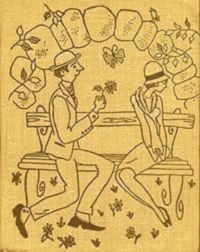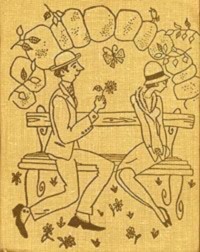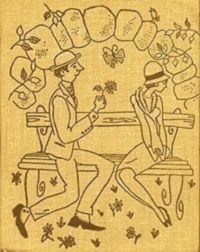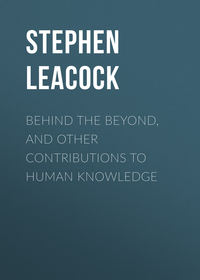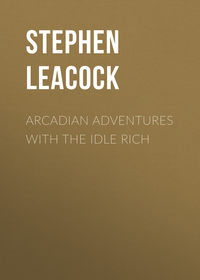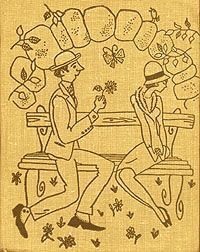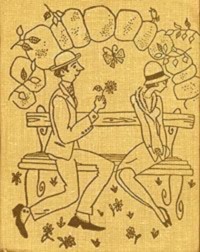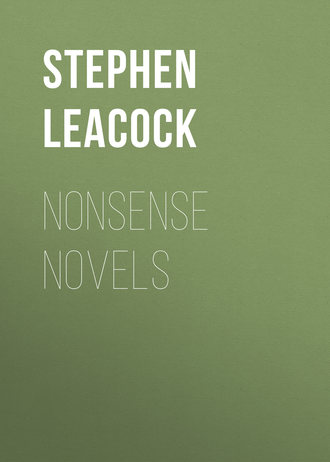 полная версия
полная версияNonsense Novels
It was at this moment that a high dogcart, driven by a groom in the livery of Earl Nosh, might have been seen entering the avenue of Nosham Taws. Beside him sat a young girl, scarce more than a child, in fact not nearly so big as the groom.
The apple-pie hat which she wore, surmounted with black willow plumes, concealed from view a face so face-like in its appearance as to be positively facial.
It was—need we say it—Gertrude the Governess, who was this day to enter upon her duties at Nosham Taws.
At the same time that the dogcart entered the avenue at one end there might have been seen riding down it from the other a tall young man, whose long, aristocratic face proclaimed his birth and who was mounted upon a horse with a face even longer than his own.
And who is this tall young man who draws nearer to Gertrude with every revolution of the horse? Ah, who, indeed? Ah, who, who? I wonder if any of my readers could guess that this was none other than Lord Ronald.
The two were destined to meet. Nearer and nearer they came. And then still nearer. Then for one brief moment they met. As they passed Gertrude raised her head and directed towards the young nobleman two eyes so eye-like in their expression as to be absolutely circular, while Lord Ronald directed towards the occupant of the dogcart a gaze so gaze-like that nothing but a gazelle, or a gas-pipe, could have emulated its intensity.
Was this the dawn of love? Wait and see. Do not spoil the story.
Let us speak of Gertrude. Gertrude DeMongmorenci McFiggin had known neither father nor mother. They had both died years before she was born. Of her mother she knew nothing, save that she was French, was extremely beautiful, and that all her ancestors and even her business acquaintances had perished in the Revolution.
Yet Gertrude cherished the memory of her parents. On her breast the girl wore a locket in which was enshrined a miniature of her mother, while down her neck inside at the back hung a daguerreotype of her father. She carried a portrait of her grandmother up her sleeve and had pictures of her cousins tucked inside her boot, while beneath her— but enough, quite enough.
Of her father Gertrude knew even less. That he was a high-born English gentleman who had lived as a wanderer in many lands, this was all she knew. His only legacy to Gertrude had been a Russian grammar, a Roumanian phrase-book, a theodolite, and a work on mining engineering.
From her earliest infancy Gertrude had been brought up by her aunt. Her aunt had carefully instructed her in Christian principles. She had also taught her Mohammedanism to make sure.
When Gertrude was seventeen her aunt had died of hydrophobia.
The circumstances were mysterious. There had called upon her that day a strange bearded man in the costume of the Russians. After he had left, Gertrude had found her aunt in a syncope from which she passed into an apostrophe and never recovered.
To avoid scandal it was called hydrophobia. Gertrude was thus thrown upon the world. What to do? That was the problem that confronted her.
It was while musing one day upon her fate that Gertrude's eye was struck with an advertisement.
"Wanted a governess; must possess a knowledge of French, Italian, Russian, and Roumanian, Music, and Mining Engineering. Salary 1 pound, 4 shillings and 4 pence halfpenny per annum.
Apply between half-past eleven and twenty-five minutes to twelve at No. 41 A Decimal Six, Belgravia Terrace. The Countess of Nosh."
Gertrude was a girl of great natural quickness of apprehension, and she had not pondered over this announcement more than half an hour before she was struck with the extraordinary coincidence between the list of items desired and the things that she herself knew.
She duly presented herself at Belgravia Terrace before the Countess, who advanced to meet her with a charm which at once placed the girl at her ease.
"You are proficient in French," she asked.
"Oh, oui," said Gertrude modestly.
"And Italian," continued the Countess.
"Oh, si," said Gertrude.
"And German," said the Countess in delight.
"Ah, ja," said Gertrude.
"And Russian?"
"Yaw."
"And Roumanian?"
"Jep."
Amazed at the girl's extraordinary proficiency in modern languages, the Countess looked at her narrowly. Where had she seen those lineaments before? She passed her hand over her brow in thought, and spit upon the floor, but no, the face baffled her.
"Enough," she said, "I engage you on the spot; to-morrow you go down to Nosham Taws and begin teaching the children. I must add that in addition you will be expected to aid the Earl with his Russian correspondence. He has large mining interests at Tschminsk."
Tschminsk! why did the simple word reverberate upon Gertrude's ears? Why? Because it was the name written in her father's hand on the title page of his book on mining. What mystery was here?
It was on the following day that Gertrude had driven up the avenue.
She descended from the dogcart, passed through a phalanx of liveried servants drawn up seven-deep, to each of whom she gave a sovereign as she passed and entered Nosham Taws.
"Welcome," said the Countess, as she aided Gertrude to carry her trunk upstairs.
The girl presently descended and was ushered into the library, where she was presented to the Earl. As soon as the Earl's eye fell upon the face of the new governess he started visibly. Where had he seen those lineaments? Where was it? At the races, or the theatre—on a bus—no. Some subtler thread of memory was stirring in his mind. He strode hastily to the sideboard, drained a dipper and a half of brandy, and became again the perfect English gentleman.
While Gertrude has gone to the nursery to make the acquaintance of the two tiny golden-haired children who are to be her charges, let us say something here of the Earl and his son.
Lord Nosh was the perfect type of the English nobleman and statesman. The years that he had spent in the diplomatic service at Constantinople, St. Petersburg, and Salt Lake City had given to him a peculiar finesse and noblesse, while his long residence at St. Helena, Pitcairn Island, and Hamilton, Ontario, had rendered him impervious to external impressions. As deputy-paymaster of the militia of the county he had seen something of the sterner side of military life, while his hereditary office of Groom of the Sunday Breeches had brought him into direct contact with Royalty itself.
His passion for outdoor sports endeared him to his tenants. A keen sportsman, he excelled in fox-hunting, dog-hunting, pig-killing, bat-catching and the pastimes of his class.
In this latter respect Lord Ronald took after his father. From the start the lad had shown the greatest promise. At Eton he had made a splendid showing at battledore and shuttlecock, and at Cambridge had been first in his class at needlework. Already his name was whispered in connection with the All-England ping-pong championship, a triumph which would undoubtedly carry with it a seat in Parliament.
Thus was Gertrude the Governess installed at Nosham Taws.
The days and the weeks sped past.
The simple charm of the beautiful orphan girl attracted all hearts. Her two little pupils became her slaves. "Me loves oo," the little Rasehellfrida would say, leaning her golden head in Gertrude's lap. Even the servants loved her. The head gardener would bring a bouquet of beautiful roses to her room before she was up, the second gardener a bunch of early cauliflowers, the third a spray of late asparagus, and even the tenth and eleventh a sprig of mangel-wurzel of an armful of hay. Her room was full of gardeners all the time, while at evening the aged butler, touched at the friendless girl's loneliness, would tap softly at her door to bring her a rye whiskey and seltzer or a box of Pittsburg Stogies. Even the dumb creatures seemed to admire her in their own dumb way. The dumb rooks settled on her shoulder and every dumb dog around the place followed her.
And Ronald! ah, Ronald! Yes, indeed! They had met. They had spoken.
"What a dull morning," Gertrude had said. "Quelle triste matin!
Was fur ein allerverdamnter Tag!"
"Beastly," Ronald had answered.
"Beastly!!" The word rang in Gertrude's ears all day.
After that they were constantly together. They played tennis and ping-pong in the day, and in the evening, in accordance with the stiff routine of the place, they sat down with the Earl and Countess to twenty-five-cent poker, and later still they sat together on the verandah and watched the moon sweeping in great circles around the horizon.
It was not long before Gertrude realised that Lord Ronald felt towards her a warmer feeling than that of mere ping-pong. At times in her presence he would fall, especially after dinner, into a fit of profound subtraction.
Once at night, when Gertrude withdrew to her chamber and before seeking her pillow, prepared to retire as a preliminary to disrobing—in other words, before going to bed, she flung wide the casement (opened the window) and perceived (saw) the face of Lord Ronald. He was sitting on a thorn bush beneath her, and his upturned face wore an expression of agonised pallor.
Meanwhile the days passed. Life at the Taws moved in the ordinary routine of a great English household. At 7 a gong sounded for rising, at 8 a horn blew for breakfast, at 8.30 a whistle sounded for prayers, at 1 a flag was run up at half-mast for lunch, at 4 a gun was fired for afternoon tea, at 9 a first bell sounded for dressing, at 9.15 a second bell for going on dressing, while at 9.30 a rocket was sent up to indicate that dinner was ready. At midnight dinner was over, and at 1 a.m. the tolling of a bell summoned the domestics to evening prayers.
Meanwhile the month allotted by the Earl to Lord Ronald was passing away. It was already July 15, then within a day or two it was July 17, and, almost immediately afterwards, July 18.
At times the Earl, in passing Ronald in the hall, would say sternly, "Remember, boy, your consent, or I disinherit you."
And what were the Earl's thoughts of Gertrude? Here was the one drop of bitterness in the girl's cup of happiness. For some reason that she could not divine the Earl showed signs of marked antipathy.
Once as she passed the door of the library he threw a bootjack at her. On another occasion at lunch alone with her he struck her savagely across the face with a sausage.
It was her duty to translate to the Earl his Russian correspondence. She sought in it in vain for the mystery. One day a Russian telegram was handed to the Earl. Gertrude translated it to him aloud.
"Tutchemoff went to the woman. She is dead."
On hearing this the Earl became livid with fury, in fact this was the day that he struck her with the sausage.
Then one day while the Earl was absent on a bat hunt, Gertrude, who was turning over his correspondence, with that sweet feminine instinct of interest that rose superior to ill-treatment, suddenly found the key to the mystery.
Lord Nosh was not the rightful owner of the Taws. His distant cousin of the older line, the true heir, had died in a Russian prison to which the machinations of the Earl, while Ambassador at Tschminsk, had consigned him. The daughter of this cousin was the true owner of Nosham Taws.
The family story, save only that the documents before her withheld the name of the rightful heir, lay bare to Gertrude's eye.
Strange is the heart of woman. Did Gertrude turn from the Earl with spurning? No. Her own sad fate had taught her sympathy.
Yet still the mystery remained! Why did the Earl start perceptibly each time that he looked into her face? Sometimes he started as much as four centimetres, so that one could distinctly see him do it. On such occasions he would hastily drain a dipper of rum and vichy water and become again the correct English gentleman.
The denouement came swiftly. Gertrude never forgot it.
It was the night of the great ball at Nosham Taws. The whole neighbourhood was invited. How Gertrude's heart had beat with anticipation, and with what trepidation she had overhauled her scant wardrobe in order to appear not unworthy in Lord Ronald's eyes. Her resources were poor indeed, yet the inborn genius for dress that she inherited from her French mother stood her in good stead. She twined a single rose in her hair and contrived herself a dress out of a few old newspapers and the inside of an umbrella that would have graced a court. Round her waist she bound a single braid of bagstring, while a piece of old lace that had been her mother's was suspended to her ear by a thread.
Gertrude was the cynosure of all eyes. Floating to the strains of the music she presented a picture of bright girlish innocence that no one could see undisenraptured.
The ball was at its height. It was away up!
Ronald stood with Gertrude in the shrubbery. They looked into one another's eyes.
"Gertrude," he said, "I love you."
Simple words, and yet they thrilled every fibre in the girl's costume.
"Ronald!" she said, and cast herself about his neck.
At this moment the Earl appeared standing beside them in the moonlight. His stern face was distorted with indignation.
"So!" he said, turning to Ronald, "it appears that you have chosen!"
"I have," said Ronald with hauteur.
"You prefer to marry this penniless girl rather than the heiress I have selected for you."
Gertrude looked from father to son in amazement.
"Yes," said Ronald.
"Be it so," said the Earl, draining a dipper of gin which he carried, and resuming his calm. "Then I disinherit you. Leave this place, and never return to it."
"Come, Gertrude," said Ronald tenderly, "let us flee together."
Gertrude stood before them. The rose had fallen from her head. The lace had fallen from her ear and the bagstring had come undone from her waist. Her newspapers were crumpled beyond recognition. But dishevelled and illegible as she was, she was still mistress of herself.
"Never," she said firmly. "Ronald, you shall never make this sacrifice for me." Then to the Earl, in tones of ice, "There is a pride, sir, as great even as yours. The daughter of Metschnikoff McFiggin need crave a boon from no one."
With that she hauled from her bosom the daguerreotype of her father and pressed it to her lips.
The earl started as if shot. "That name!" he cried, "that face! that photograph! stop!"
There! There is no need to finish; my readers have long since divined it. Gertrude was the heiress.
The lovers fell into one another's arms. The Earl's proud face relaxed. "God bless you," he said. The Countess and the guests came pouring out upon the lawn. The breaking day illuminated a scene of gay congratulations.
Gertrude and Ronald were wed. Their happiness was complete. Need we say more? Yes, only this. The Earl was killed in the hunting-field a few days after. The Countess was struck by lightning. The two children fell down a well. Thus the happiness of Gertrude and Ronald was complete.
V. – A Hero in Homespun: or, The Life Struggle of Hezekiah Hayloft
"CAN you give me a job?"
The foreman of the bricklayers looked down from the scaffold to the speaker below. Something in the lad's upturned face appealed to the man. He threw a brick at him.
It was Hezekiah Hayloft. He was all in homespun. He carried a carpet-bag in each hand. He had come to New York, the cruel city, looking for work.
Hezekiah moved on. Presently he stopped in front of a policeman.
"Sir," he said, "can you tell me the way to–"
The policeman struck him savagely across the side of the head.
"I'll learn you," he said, "to ask damn fool questions–"
Again Hezekiah moved on. In a few moments he met a man whose tall black hat, black waistcoat and white tie proclaimed him a clergyman.
"Good sir," said Hezekiah, "can you tell me–"
The clergyman pounced upon him with a growl of a hyena, and bit a piece out of his ear. Yes, he did, reader. Just imagine a clergyman biting a boy in open daylight! Yet that happens in New York every minute.
Such is the great cruel city, and imagine looking for work in it. You and I who spend our time in trying to avoid work can hardly realise what it must mean. Think how it must feel to be alone in New York, without a friend or a relation at hand, with no one to know or care what you do. It must be great!
For a few moments Hezekiah stood irresolute. He looked about him. He looked up at the top of the Metropolitan Tower. He saw no work there. He looked across at the skyscrapers on Madison Square, but his eye detected no work in any of them. He stood on his head and looked up at the flat-iron building. Still no work in sight.
All that day and the next Hezekiah looked for work.
A Wall Street firm had advertised for a stenographer.
"Can you write shorthand?" they said.
"No," said the boy in homespun, "but I can try."
They threw him down the elevator.
Hezekiah was not discouraged. That day he applied for fourteen jobs.
The Waldorf Astoria was in need of a chef. Hezekiah applied for the place.
"Can you cook?" they said.
"No," said Hezekiah, "but oh, sir, give me a trial, give me an egg and let me try—I will try so hard." Great tears rolled down the boy's face.
They rolled him out into the corridor.
Next he applied for a job as a telegrapher. His mere ignorance of telegraphy was made the ground of refusal.
At nightfall Hezekiah Hayloft grew hungry. He entered again the portico of the Waldorf Astoria. Within it stood a tall man in uniform.
"Boss," said the boy hero, "will you trust me for the price of a square meal?"
They set the dog on him.
Such, reader, is the hardness and bitterness of the Great City.
For fourteen weeks Hezekiah Hayloft looked for work. Once or twice he obtained temporary employment only to lose it again.
For a few days he was made accountant in a trust company. He was discharged because he would not tell a lie. For about a week he held a position as cashier in a bank. They discharged the lad because he refused to forge a cheque. For three days he held a conductorship on a Broadway surface car. He was dismissed from this business for refusing to steal a nickel.
Such, reader, is the horrid degradation of business life in
New York.
Meantime the days passed and still Hayloft found no work. His stock of money was exhausted. He had not had any money anyway. For food he ate grass in Central Park and drank the water from the Cruelty to Animals horse-trough.
Gradually a change came over the lad; his face grew hard and stern, the great city was setting its mark upon him.
One night Hezekiah stood upon the sidewalk. It was late, long after ten o'clock. Only a few chance pedestrians passed.
"By Heaven!" said Hezekiah, shaking his fist at the lights of the cruel city, "I have exhausted fair means, I will try foul. I will beg. No Hayloft has been a beggar yet," he added with a bitter laugh, "but I will begin."
A well-dressed man passed along.
Hezekiah seized him by the throat.
"What do you want?" cried the man in sudden terror. "Don't ask me for work. I tell you I have no work to give."
"I don't want work," said Hezekiah grimly. "I am a beggar."
"Oh! is that all," said the man, relieved. "Here, take this ten dollars and go and buy a drink with it."
Money! money! and with it a new sense of power that rushed like an intoxicant to Hezekiah's brain.
"Drink," he muttered hoarsely, "yes, drink."
The lights of a soda-water fountain struck his eye.
"Give me an egg phosphate," he said as he dashed his money on the counter. He drank phosphate after phosphate till his brain reeled. Mad with the liquor, he staggered to and fro in the shop, weighed himself recklessly on the slot machine three or four times, tore out chewing gum and matches from the automatic nickel boxes, and finally staggered on to the street, reeling from the effects of thirteen phosphates and a sarsaparilla soda.
"Crime," he hissed. "Crime, crime, that's what I want."
He noticed that the passers-by made way for him now with respect. On the corner of the street a policeman was standing.
Hezekiah picked up a cobblestone, threw it, and struck the man full on the ear.
The policeman smiled at him roguishly, and then gently wagged his finger in reproof. It was the same policeman who had struck him fourteen weeks before for asking the way.
Hezekiah moved on, still full of his new idea of crime. Down the street was a novelty shop, the window decked with New Year's gifts.
"Sell me a revolver," he said.
"Yes, sir," said the salesman. "Would you like something for evening wear, or a plain kind for home use. Here is a very good family revolver, or would you like a roof garden size?"
Hezekiah selected a revolver and went out.
"Now, then," he muttered, "I will burglarise a house and get money."
Walking across to Fifth Avenue he selected one of the finest residences and rang the bell.
A man in livery appeared in the brightly lighted hall.
"Where is your master?" Hezekiah asked, showing his revolver.
"He is upstairs, sir, counting his money," the man answered, "but he dislikes being disturbed."
"Show me to him," said Hezekiah, "I wish to shoot him and take his money."
"Very good, sir," said the man deferentially. "You will find him on the first floor."
Hezekiah turned and shot the footman twice through the livery and went upstairs.
In an upper room was a man sitting at a desk under a reading-lamp. In front of him was a pile of gold.
"What are you doing?" said Hezekiah.
"I am counting my money," said the man.
"What are you?" asked Hezekiah sternly.
"I am a philanthropist," said the man. "I give my money to deserving objects. I establish medals for heroes. I give prizes for ship captains who jump into the sea, and for firemen who throw people from the windows of upper stories at the risk of their own; I send American missionaries to China, Chinese missionaries to India, and Indian missionaries to Chicago. I set aside money to keep college professors from starving to death when they deserve it."
"Stop!" said Hezekiah, "you deserve to die. Stand up. Open your mouth and shut your eyes."
The old man stood up.
There was a loud report. The philanthropist fell. He was shot through the waistcoat and his suspenders were cut to ribbons.
Hezekiah, his eyes glittering with the mania of crime, crammed his pockets with gold pieces.
There was a roar and hubbub in the street below.
"The police!" Hezekiah muttered. "I must set fire to the house and escape in the confusion."
He struck a safety match and held it to the leg of the table.
It was a fireproof table and refused to burn. He held it to the
door. The door was fireproof. He applied it to the bookcase.
He ran the match along the books. They were all fireproof.
Everything was fireproof.
Frenzied with rage, he tore off his celluloid collar and set fire to it. He waved it above his head. Great tongues of flame swept from the windows.
"Fire! Fire!" was the cry.
Hezekiah rushed to the door and threw the blazing collar down the elevator shaft. In a moment the iron elevator, with its steel ropes, burst into a mass of flame; then the brass fittings of the door took fire, and in a moment the cement floor of the elevator was one roaring mass of flame. Great columns of smoke burst from the building.
"Fire! Fire!" shouted the crowd.
Reader, have you ever seen a fire in a great city? The sight is a wondrous one. One realises that, vast and horrible as the city is, it nevertheless shows its human organisation in its most perfect form.
Scarcely had the fire broken out before resolute efforts were made to stay its progress. Long lines of men passed buckets of water from hand to hand.
The water was dashed on the fronts of the neighbouring houses, thrown all over the street, splashed against the telegraph poles, and poured in torrents over the excited crowd. Every place in the neighbourhood of the fire was literally soaked. The man worked with a will. A derrick rapidly erected in the street reared itself to the height of sixteen or seventeen feet. A daring man mounted on the top of it, hauled bucket after bucket of water on the pulley. Balancing himself with the cool daring of the trained fireman, he threw the water in all directions over the crowd.



